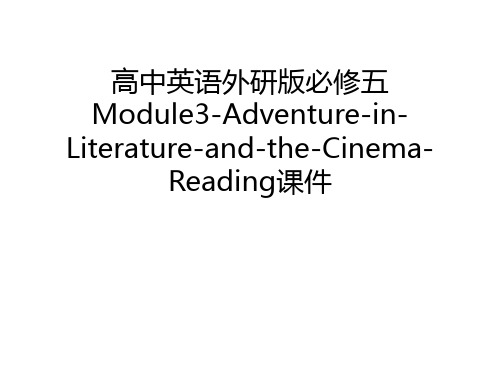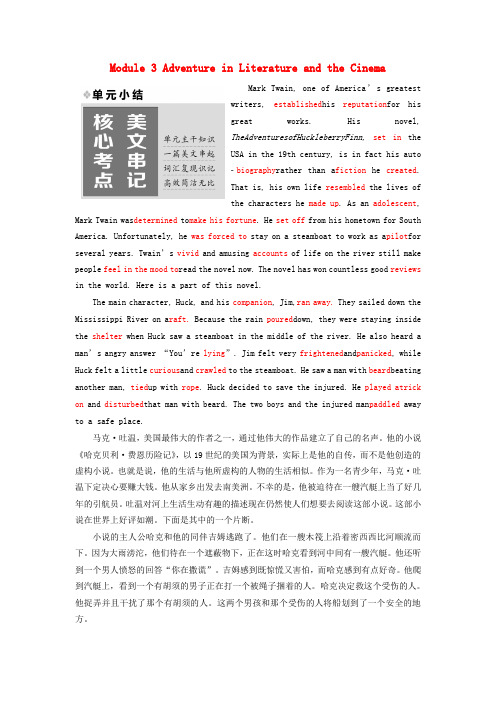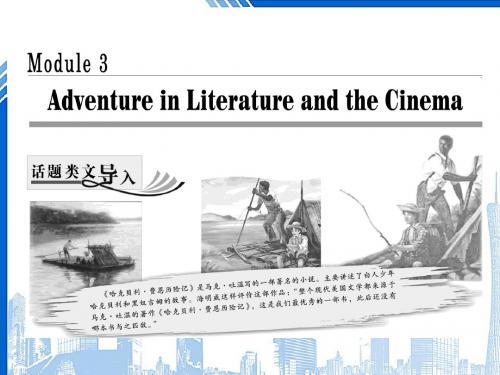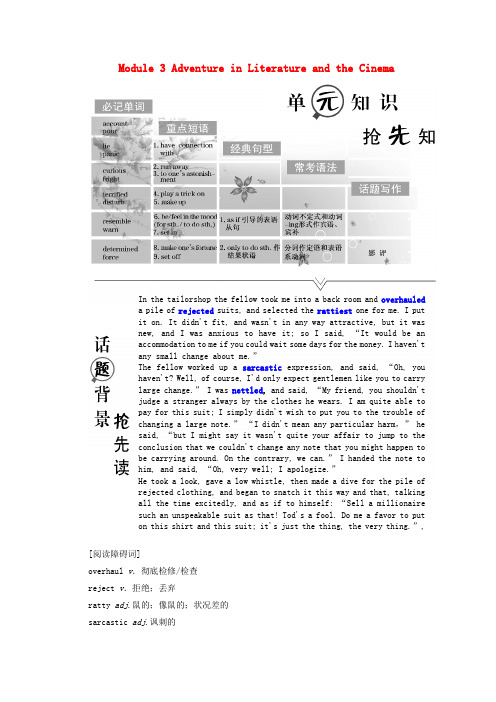高中英语 Module 3 Adventure in the Literature 说课稿 外研版选修7
- 格式:doc
- 大小:40.00 KB
- 文档页数:3

号顿市安谧阳光实验学校Module 3 Adventure in Literature and the Cinema同步测试一、短语再现1.___________________ 与……有关系2. ___________(秘密地)逃跑3.__________________ 捉弄某人,对某人恶作剧4. ___________ 编造(说法解释等)…5.____________有意(做…),有做…的心情6. ________ 设置(戏剧小说等的)背景7._________________ 决定去发大财 8. ________________ 警告某人当心……9. __________________ 说服某人做某事 10.____________________让人惊讶的是11.__________________(雨)瓢泼而下12._____________________借着闪电13._____________________上一艘要沉的船 14.________________________受够了15. _______________________顺流而下 16._______________________稍等一下17. ________________________赶快 18._______________________快速的吃19. _________________________首先 20. ___________________过着冒险的生活21. ___________________确立名作家的声誉 22.____________________动身离家23. _______________________被迫改变计划 24._______________________身无分文二、重点句型回顾1.The short man ___________________________(建议留) the man on the floor.2. But I _________________(劝他帮我), and we founded the men’s boat ________________(拴在另一侧的) the steamboat.3. We stayed inside the shelter we had built and let the raft_____________(顺流航行) the river.4. Suddenly, _______________(借助闪电的光亮),we saw something in the middle of the river.5. There were two men _______________(站在他面前) him.6. It was quite dark, but I could see a man ____________(躺在地板上), __________(被绳子绑着).7. I have ______________________(受够了) you. I’m going to shoot you new,”...8. _______________(使我们大吃一惊的是), there was a light in one of the cabins.9. So we _____________(划过去) and climbed on to the steamboat,____________________(象耗子一样悄无声息地).10. He left school early, and as adolescent, _____________________(决定去发大财) in South America, set off from…11. He arrived in New Orleans ____________________(身无分文)____________(却发现)that …12. Which film ______ Billy__________________? (没心情看)13. __________________(被迫改变计划), he worked for several years asa pilot on a steamboat, _______(带着)passengers up and down the Mississippi…14. He _______________________________(特别喜欢捉弄) the three men.三、单项选择1.What a great weight the mother felt _______ her mind the moment she found her lost son.A.turned off B.taken off C.set off D.brought off 2.The famous poet the professor often referred _______ , and paid a visit to our university last week.A.to arrive B.arrived C.to arriving D.to arrived3.The train arrives in Liverpool at 10 p.m. tonight. The plane I would like to take from there ______ by then. A.will leave B.would have left C.will have left D.has left4.It was reported that it was eleven o’clock ________ the group of soldiers began attack the beachhead.A.when B.that C.before D.since 5.A group of students led by their teacher reached _____ was once an old temple______ the villagers used as a primary school for children’s education.A.which , where B.what , which C.where , which D.what, where 6.--- How dare she do that ?---_______ to what you did , whatever she did was reasonable. What’s more, it is none of your business. Can’t you get down to ______ your lessons?A.Comparing, doing B.Comparing, do C.Compared ,doing D.Compared, do7.Last mid-term examination our teacher set such a difficult mathematics problem ______ none of us could work out .A.that B.as C.which D.where8.At the press conference the president stepped onto the platform and sat down, ________ for answering the questions about some mid-east issues.A.had prepared B.being prepared C.preparing D.prepared9.I think a book, though cheap, will_______ a good birthday present for your daughter, which will benefit her a lot .A.give B.make C.turn D.do 10.My advice is that you should avoid _______ as if you are objecting to others. But don’t be afraid to offend them if worth it. A.sound B.to sound C.sounding D.being sounded11.--- Do you think an advertisement is _____ help when you look for a new job?--- Well, it all depends. Anyway, it gives me more of ____ chance to try .A. a ; a B. / ; / C. the ; the D. a ; the 12.--- What makes you so worried? --- _______ .A.Because of my weight B.I’ve lost some weightC.That I’m putting on weight D.Because I’ve put on weight13.--- How about putting some pictures into the report?--- ________. A picture is worth a thousand words.A.No way B.It couldn’t be better C.All right D.Not a bit14.--- Nancy is not coming tonight.--- But she ______ me. I don’t understand why she ___ her mind.A.promised ; has changed B.promised; changed C.has promised ; has changed D.has promised ; changed 15.--- On what way do you think Amy will use her new bicycle?--- ________ for going to work.A.Mostly B.Nearly C.Most D.Almost四、完形填空I had my first chocolate bar at five years old. I’ll never forget the 16 , comforting taste. But the situations were 17 but sweet. Itwas World War II. I 18 with my family in the Lithuanian town of Taurage19 the Russian army swept west Nazi Germany. Many people in our village20 away in terror.In the confusion, I stood with my 12-year-old sister, and my three-year-old brother, near the railway 21 , where a train for Germany waited. 22 families were allowed to board the train. Just before leaving, a woman traveling 23 approached us. “I’ll take care of him,” she told my sister, and 24 me onto the train as it left the station. The whole trip I 25 my mother.We arrived in Hamburg. Now that the woman had 26 Taurage she had no more use for me. I lived on the 27 like thousands of other children in that war-torn city. I survived 28 stealing food. Then the American army arrived.One afternoon as I hid 29 in a mess tent in search of food, a huge hand lifted me up by the collar—an American soldier. I was 30 and I could see it upset him. “It’s okay, kid,” he said. He reached into his jacket and handed me a chocolate bar. I 31 it and took a small bite.I thought I’d gone to heaven.The soldier took me and some other 32 children to an orphanage(孤儿院) run by Red Cross. Four years later I was transferred to an orphanage in America. 33 a family who lived in Pennsylvania adopted me. Later I joined the Army, then attended college after the army and 34 a master’s degree in clinical(临床的) social work.I never did learn the soldier God sent to save my life, but I remember his 35 forever.16. A. poor B. had C. terrible D. delicious17. A. anything B. something C. nothing D. everything18. A. worked B. met C. lived D. talked19. A. when B. as if C. even if D. after20. A. fought B. run C. followed D. faced21. A. school B. home C. church D. station22. A. Only B. Already C. Still D.Once23. A. away B. alone C. along D. nearby24. A. pulled B. saved C. beat D. stopped25. A. cared about B. cried for C. called on D. calmed down26. A. stayed B. liked C. hated D. escaped27. A. streets B. troops C. buses D. trains28. A. through B. besides C. by D. without29. A. himself B. myself C. themselves D. herself30. A. pleased B. excited C. scared D. satisfied31. A. damaged B. covered C. unwrapped D. shut32. A. homeless B. hopeless C. useless D.careless33. A. So far B. After all C. Soon afterD. Long before34. A. controlled B. changed C. improved D. earned35. A. kindness B. shortcoming C. harm D. ugliness五、阅读理解I was walking along the main street of a small seaside town in the north of England looking for somewhere to make a phone call. My car had broken down outside the town and I wanted to contact the AA. Low grey clouds were gathering across the sky and there was a cold damp wind blowing off the sea which nearly threw me off my feet every time I crossed one of the side streets. It had rained in the night and water was dripping from the bare trees that lined the street. I was glad that I was wearing a thick coat.There was no sign of a call box, nor was there anyone at that early hour whom I could ask. I had thought I might find a shop open selling the Sunday papers or a milkman doing his rounds, but the town was completely dead. The only living thing I saw was a thin frightened cat outside a small restaurant.Then suddenly I found what I was looking for. There was a small post office, and almost hidden from sight in a dark narrow street next to it was the town’s only public call box, which badly needed a coat of paint.I hurried forward, but stopped in astonishment when I saw through the dirty glass that there was a man inside. He was fat, and was wearing a cheap blue plastic raincoat. I could not see his face and he did not even raise his head at the sound of my footsteps.Discreetly(谨慎地), I remained standing a few feet away and lit a cigarette to wait my turn. It was when I threw the dead match on the ground that I noticed something bright red trickling from under the call box door.36. Why did the author enter the town?A. He wanted to repair his car.B. His car had broken down outside the town and he wanted to contact the AA.C. He wanted to visit an old friend.D. He wanted pay a visit to the town.37. At what time was the story set?A. An early winter morning.B. A cold winter afternoon.C. An early summer morning.D. A windy summer afternoon.38. Which of the following words best describe the writer’s impression of the town?A. Cold and frightening. B. Dirty and crowded.C. Empty and dead.D. Unusual and unpleasant.39. The underlined word “trickling” in the last paragraph probably meansA. rushing out suddenlyB. shining brightlyC. flowing slowly in dropsD. appearing slowly in a red color40. Why didn’t the man raise his head when the writer came near?A. He was annoyed at being seen by the writer.B. He was angry at being disturbed by the writer.C. He was probably fast asleep.D. He was probably murdered.BJames Langston Hughes finally arrived in New York on September 4, 1921 to attend Colombia University. Langston felt frustrated at Colombia due to the discrimination of his white classmates. His grades began to suffer and finally he left and looked for a job.Job were still hard to come by for most blacks. He longed to work on a ship that would sail abroad. After much persistence, he headed to Africa on a freighter ( 货船 ). Hughes was disturbed by the African tribes’ lack of political and economical freedom. The Africans considered him white because of his brown skin and stranded dark hair.It was here that he met a mulatto (白黑混血)child who was ignored by the Africans and the whites. This was a sourced of inspiration for his play, “Mulatto”.Hughes found work on another freighter and ended up in Pairs. While there he worked at a night club that featured southern cooking and jazz performers. While moving on to Italy, Hughed was robbed and left stranded ( helpless ) wanting to return to the United States. He tried to get a job on a ship heading for the U.S.A. but was told they only hired the white. In this depr essed state of mind he wrote, “I, Too, Sing America.”He returned to America and found the Harlem Renaissance was spreading across racial boundaries ( 种族界线 ). Many black poets and authors were now published in mainstream publications. Hughes was warmly welcomed by his peers (同辈)and recognized for the poetry he wrote while traveling.41. What inspired James Hughes to white the play “Mulatto”?A. Neither the African nor the whites took care of a mulatto child he met.B. The African did not like white people.C. Blacks found it hard to find a decent job.D. There was no political nor economical freedom in Africa.42. How did Hughes pay for his trip from Africa to Paris?A. He sold his poems.B. He got a job on ship.C. He worked for a night club.D. His African friends gave him some money.43. What happened to Hughes at Colombia University?A. His white classmates were kind and helpful to him.B. He was recognized as a promising poet.C. He graduated with honors.D. He was very disappointed.44. Why was Hughes recognized?A. Because he was a black.B. Because of his poetry he wrote while traveling.C. Because of the Harlem Renaissance.D. Because he was an America.45. Why did he leave school?A. Langston felt frustrated at ColombiaB. Because of the discrimination of his white classmates.C. His grades began to sufferD. All the above.六、写作你给你的笔友介绍你读书的好方法——记笔记。

Module 3 Adventure in Literature and the Cinema主旨大意题之标题归纳题(阅读理解)方法指导在阅读理解中,确定文章标题时通常采用中心句法。
通读文章找到文章的中心句,根据中心句的关键词锁定最佳标题。
同时,确定最佳标题时还要注意下面两个问题:1)文章标题的确定要在原文的基础上,首先仔细考虑所要确定的标题与文章的中心思想是否有密切的关系;其次看它对文章的概括性或覆盖性如何;最后要注意题目是过大或过小。
2)确定文章的标题要避免下列三种错误:(1) 概括不够,以部分代整体。
(2) 过度概括,即选择的标题太过于笼统,从而无形中扩大了范围而导致不能对应材料的主旨大意。
(3) 以事实、细节替代抽象的主旨大意。
典例引领 (2016全国卷Ⅰ,D)The meaning of silence varies among cultural groups.Silences may be thoughtful, or they may be empty when a person has nothing to say. A silence in a conversation may also show stubbornness, uneasiness, or worry. Silence may be viewed by some cultural groups as extremely uncomfortable; therefore attempts may be made to fill every gap(间隙)with conversation. Persons in other cultural groups value silence and view it as necessary for understanding a person’s needs.Many Native Americans value silence and feel it is a basic part of communicating among people, just as some traditional Chinese and Thai persons do. Therefore, when a person from one of these cultures is speaking and suddenly stops, what may be implied(暗示) is that the person wants the listener to consider what has been said before continuing. In these cultures, silence is a call for reflection.Other cultures may use silence in other ways, particularly when dealing with conflicts among people or in relationships of people with different amounts of power. For example, Russian, French, and Spanish persons may use silence to show agreement between parties about the topic under discussion. However, Mexicans may use silence when instructions are given by a person in authority rather than be rude to that person by arguing with him or her. In still another use, persons in Asian cultures may view silence as a sign of respect, particularly to an elder or a person in authority.Nurses and other care-givers need to be aware of the possible meanings of silence when they come across the personal anxiety their patients may be experiencing. Nurses should recognize their own personal and cultural construction of silence so that a patient’s silence is not interrupted too ea rly or allowed to go on unnecessarily. A nurse who understands the healing(治愈)value of silence can use this understanding to assist in the care of patients from their own and from other cultures.1.What does the author say about silence in conversations?A.It implies anger.B.It promotes friendship.C.It is culture-specific.D.It is content-based.2.Which of the following people might regard silence as a call for careful thought?A.The Chinese.B.The French.C.The Mexicans.D.The Russians.3.What does the author advise nurses to do about silence?A.Let it continue as the patient pleases.B.Break it while treating patients.C.Evaluate its harm to patients.D.Make use of its healing effects.4.What may be the best title for the text?A.Sound and SilenceB.What It Means to Be SilentC.Silence to Native AmericansD.Speech Is Silver; Silence Is Gold方法运用[语篇解读] 本文是一篇议论文。


Module 3 Adventure in Literature and the CinemaMark Twain, one of America’s greatestwriters, established his reputation for hisgreat works. His novel,TheAdventuresofHuckleberryFinn, set in theUSA in the 19th century, is in fact his autobiography rather than a fiction he created.That is, his own life resembled the lives ofthe characters he made up. As an adolescent, Mark Twain was determined to make his fortune. He set off from his hometown for South America. Unfortunately, he was forced to stay on a steamboat to work as a pilot for several years. Twain’s vivid and amusing accounts of life on the river still make people feel in the mood to read the novel now. The novel has won countless good reviews in the world. Here is a part of this novel.The main character, Huck, and his companion, Jim,ran away.They sailed down the Mississippi River on a raft. Because the rain poured down, they were staying inside the shelter when Huck saw a steamboat in the middle of the river. He also heard a man’s angry answer “You’re lying”. Jim felt very frightened and panicked, while Huck felt a little curious and crawled to the steamboat. He saw a man with beard beating another man, tied up with rope. Huck decided to save the injured. He played atrick on and disturbed that man with beard. The two boys and the injured man paddled away to a safe place.马克·吐温,美国最伟大的作者之一,通过他伟大的作品建立了自己的名声。


Module 3 Adventure in Literature and the CinemaIn the tailorshop the fellow took me into a back room and overhauleda pile of rejected suits, and selected the rattiest one for me. I putit on. It didn't fit, and wasn't in any way attractive, but it wasnew, and I was anxious to have it; so I said, “It would be anaccommodation to me if you could wait some days for the money. I haven'tany small change about me.”The fellow worked up a sarcastic expression, and said, “Oh, youhaven't? Well, of course, I'd only expect gentlemen like you to carrylarge change.” I was nettled, and said, “My friend, you shouldn'tjudge a stranger always by the clothes he wears. I am quite able topay for this suit; I simply didn't wish to put you to the trouble ofchanging a large note.” “I didn't mean any particular harm,” hesaid, “but I might say it wasn't quite your affair to jump to theconclusion that we couldn't change any note that you might happen tobe carrying around. On the contrary, we can.” I handed the note tohim, and said, “Oh, very well; I apologize.”He took a look, gave a low whistle, then made a dive for the pile ofrejected clothing, and began to snatch it this way and that, talkingall the time excitedly, and as if to himself: “Sell a millionairesuch an unspeakable suit as that! Tod's a fool. Do me a favor to puton this shirt and this suit; it's just the thing, the very thing.”,[阅读障碍词]overhaul v.彻底检修/检查reject v.拒绝;丢弃ratty adj.鼠的;像鼠的;状况差的sarcastic adj.讽刺的nettle vt.刺激;惹恼Ⅰ.Match the word with its meaning.1.solve A.恐惧;害怕2.account B.说谎;撒谎3.companion C.非常害怕的;极度恐慌的4.pour D.(使)恐慌;(使)惊慌失措5.lie E.好奇的6.panic F.(用绳、带等)绑,系,栓7.curious G.解决8.tie H.叙述;描写;报道9.terrified I.(雨)倾盆而下10.fright J.同伴;伙伴答案:1~5 GHJIB 6~10 DEFCAⅡ.Write down the meaning of phrases in each sentence.1.The thief had run away when the policemen came. 跑掉2.Suddenly rain began to pour down. 倾盆而下3.He often worked at night, by the light of an oil lamp. 借助……的亮光4.Shut up! I've had enough of that! 受够了5.When I hurried to school, I was almost out of breath. 上气不接下气6.I have connection with my old friends. 与……有联系7.To my astonishment,he threw out the book and screamed at me.使我惊讶的是8.This restaurant which was once one of the best in New York has gone down steadily in the past few months. 下降9.She nearly died of fright at the sight of the escaped tiger. 吓死10.You try and persuade her to come out with us.说服某人做某事Do you like reading some stories about adventures? Can you give some examples? Why do you like reading them?I like reading stories, especially some stories about adventures, such as The Adventures of Tom Sawyer, The Adventures of Little Carp, etc. I like the heroes in the stories, for they show me some good qualities. I can learn a lot from them, which will make me an excellent person.Ⅰ.Fast reading1.Look at the title and the picture of the passage, and then tell us the main idea of the passage.The passage is about one of the stories that_happened_while_Huck_and Jim_were_sailing down the Mississippi_River_on_a_raft,_which_describes_what Huck_and_Jim_saw_and_what they_did.2.Put the sentences in order according to time.A.We heard three people talking in a cabin.B.When Jim and I left the boat, I began to regret.C.We were staying inside the shelter when we saw a steamboat.D.Jim and I climbed onto the steamboat.E.The man lying on the ground began to cry.答案:CDAEBⅡ.Careful readingRead the text carefully and choose the best answer.1.Huck and Jim boarded the sinking ship because ________.A.they wanted to save their friendB.they found some mice on the steamboatC.their raft was brokenD.they thought they might find something useful2.Huck felt________ when he heard a man's angry voice on the sinking steamboat.A.excited and curiousB.frightened but curiousC.excited but worriedD.frightened but excited3.What were the two men going to do with the man tied with a rope according tothe text?A.They were going to set him free.B.They were going to frighten him to death.C.They agreed to shoot him with a gun.D.They had different opinions about what to do with him.4.We can know from the text that________.A.Huck wanted all three men to dieB.the short man didn't want the man on the floor to dieC.Jim was not as adventurous as HuckD.Jim knew something about the two men's trick答案:1~4 DBDCⅢ.Study readingAnalyze the following difficult sentences in the text.1.So we paddled over and climbed on to the steamboat, keeping as quiet as mice.[句式分析] keeping as quiet as mice是动词ing形式短语作方式状语,与主语we 之间是主动关系,与谓语动作同时进行。
得夺市安庆阳光实验学校Module 3 Adventure in Literature and the Cinema一周强化一、本单元重难点单词与短语1.determined adj. 坚决的,决定了的determined 通常用作表语,其后跟不定式短语或从句。
e.g.If he is determined to do something, nobody can stop him from doing so.如果他决定做某事,任何人也无法阻止他去做。
All the students in our class are determined to learn English well.我们班所有的同学都决心学好英语。
His brother was determined to give us some advice on English grammar.他哥哥决定给我们提一些关于英语语法的建议。
Our teacher was determined that no one should fall behind this term.我们老师下决心这学期不让一个人掉队。
be determined to do sth.相当于determine to do sth或make up one’s mind to do sth.2.shelter(1)n. 遮盖物,遮风挡雨的地方 [C];保护,住宿[U]e.g.Trees are a shelter from the sun.树可遮蔽太阳。
We gave the old man shelter for the night. 我们给老人提供过夜之处。
Most of our money goes for food and shelter.我们大多数的钱都花在吃和住上了。
短语:take shelter 躲避风雨等While the fighting went on in the street, we took shelter in a shop. 街上打架还在继续,我们在店里躲避。
得夺市安庆阳光实验学校高二英语Module 3 Adventure in Literature and the Cinema外研社【本讲教育信息】一. 教学内容:Module 3 Adventure in Literature and the Cinema二. 教学目标:本模块通过介绍文学和电影作品中的冒险故事,要求学生通过学习了解该内容,熟悉英语文学,并掌握有关词汇,培养有关的语言技能。
单词、短语:biography fantasy have connection with detectivesolve murder account run awaycompanion raft pour shelterpaddle lie panic curioustie rope beard frightcrawl terrified trunk play a trick on sb.make up outline disturb comedyromantic fiction review be/feel in the bad moodset in resemble create exception warn shallow adolescent determinedmake one’s fortune set off penny forcepilot vivid establish reputation 重点词语:fantasy have connection with detective solverun away companion pour shelterpaddle lie panic play a trick on sb. make up disturb be/feel in the bad moodset in create warn make one’s fortuneset off force establish词语要点归纳:1. Match the types of book with their meanings.分析:offer 提供,提出,常用于以下句型:match vi/vt 和……相配;比得上;敌得上A matchB A与B相配match A against B 将A与B对比;对抗match sth. to/with sth. 使某物和某物调和例如:These gloves don’t match.I’m ready to match my strength with/against yours.拓展:match多指大小,色调,形状等方面的搭配;suit多指合乎需要,口味,性格,条件等;fit指大小,尺寸,形状合适。
Book VII Module 3 Literature
I. Analysis of the text (教材分析)
本模块内容为英国古典文学中的狄更斯作品及其生平。
本模块是文学阅读欣赏课,课文节选自英国著名小说家狄更斯《雾都孤儿》的片断“Oliver asks for more”,反映了主人公Oliver生活的是一个贫富悬殊,充满压迫的不公平的社会。
II .教学内容分析
本模块以Literature为话题,介绍了著名英国古典文学作家查尔斯•狄更斯(Charles Dickens)的生平和他的作品《雾都孤儿》(Oliver Twist)、《远大前程》(Great Expectations)的片段,旨在通过这样的话题,使学生运用所学的知识谈论小说中的人物及其情节,更多地了解作家的作品及其作品的时代背景和深刻的社会意义,让学生了解如何对人物和事件进行描写。
通过本模块学习,学生要对小说与文学有个辩证认识,学会鉴赏文学的魅力。
Introduction 通过电影Oliver Twist的一幅剧照介绍了著名作家查尔斯•狄更斯(Charles Dickens)。
并设计相关的问题对剧照中的人物和故事发展进行预测,在一定的练习中了解和熟悉所涉及到的词汇和短语,让学生进一步熟悉这些词汇,为本模块的学习奠定基础。
Reading and Vocabulary (1) 部分通过阅读《雾都孤儿》中的一段标题为“Oliver Asks for More”片段,设计了以下的任务:1. 学会对素材片段进行概括,培养学生的总结能力和对文章中心的把握能力;2. 学习相关的词汇和短语,为进一步理解课文扫清障碍,培养学生学习生词的能力,解决了方法问题,同时设计一定的练习,巩固所学习的词汇;
3. 在词汇学习的基础上,通过完成素材中的句子填写练习,完成从词到句的功能转变,让学生不仅能学习词汇,而且能更好地巩固一定固定意义的句子结构。
Grammar (1) 部分通过观察课文中的例句,要求学生能够识别倒装句的基本形式,并能运用倒装表达强调意义。
Speaking (1) 部分是阅读文章后所展开的一项活动,要求学生能够模仿其内容和角色进行适当的角色扮演练习,并对人物进行评价。
Vocabulary and Listening 部分为《雾都孤儿》的精彩片段,旨在听的基础上去理解这部小说,并完成四项任务:1. 提供一定的句子和词汇,扫清了听力中可能产生的障碍;
2. 提供问题,预测听力内容和问题答案,引导听力任务的顺利进行;
3. 听取一段精彩的片段,判断所预测的问题答案是否正确,然后回答问题;
4. 要求听第二遍,完成信息获取。
任务环环相扣,遵循听力训练的规律,真正为学生提供了模拟真实的听力材料。
Grammar 2 and Function部分列举一些句子,让学生通过先观察然后回答问题的方式了解通常情况下的强调句型,并进行适当的训练。
同时将这样的练习运用到实际的语境中,即对小说中人物进行评论,进一步巩固强调句的运用。
通过该项目,更好地将强调句的学习全面地展开和总结,让学生通过相关练习活动掌握这种表达法。
Speaking (2)部分分组进行训练,要求学生能用所学习的句型发表对听力部分所学习素材的评价和看法,并对故事情节的发展作一些猜测。
Everyday English 部分围绕日常生活中常见的交际用语,主要通过选择题的形式使学生熟练掌握这几个表达。
Reading and vocabulary (2)部分实际上是《远大前程》(Great Expectations)的故事梗概,通过这样的素材设计了三个活动:1. 文章的主旨大意和词汇;2. 通过回答问题,对文章内容的进一步理解;3. 通过阅读配的图画,判断人物之间的关系。
Writing 部分就提供的人物,要求学生围绕人物进行简单描写,尽可能地运用自己的语言,然后分组讨论,对文章进行续写。
Reading practice部分以“Dickens’ London”为标题,提供的文段是对作家狄更斯写作和生活背景的简单介绍,有利于学生更好地了解作品的背景及其深刻的社会意义。
通过提供的任务学习,让学生更好地掌握一定的阅读理解的方法和技巧:如文章体裁、文章主旨大意、文章的细节等等,而且让学生用自己的语言完成一定量的句子填空,熟悉和运用适当的句型。
并在此基础上学会描写自己的家乡。
Cultural Corner部分是一篇介绍著名作家查尔斯•狄更斯(Charles Dickens)的生平和他的作品的文章,通过学习有助于学生更好地理解这两部小说,帮助学生拓展词汇,增加作品理解的空间。
III .教学重点和难点
1. 教学重点
(1)掌握一些与小说故事情节描写有关的词汇;如何准确地概括课文内容。
(2)如何把所学的词汇,句型运用于实践中。
(3)学习倒装句;
(4)学习强调句。
2. 教学难点
(1)正确理解和听懂相关小说的片段,并能进行表演和发表看法和评论;
(2)正确使用倒装句和强调句;
IV.教学计划
本单元分六个课时:
第一、二课时:Introduction, Cultural Corner, Reading Practice
第三课时:Reading and Vocabulary (1, 2)
第四课时:Grammar (1, 2)
第五课时:Vocabulary and listening, Everyday English
第六课时:Speaking (1,2) Writing
V教学目标Teaching goals.
认知及语言技能目标:理解文章内容,并使用所学的词汇描述有关的故事情节,表达自己的情感。
能力目标:能分析课文中的长难句、理解句子结构,并能运用所学词汇和句型概括课文内容。
情感目标:培养学生阅读英语文学作品的习惯;通过分析使学生认识到主人公Oliver生活的是一个贫富悬殊,充满压迫的不公平的社会,教育学生应珍惜现在的生活,努力学习,奋发上进。
VI. 教学方法Teaching methods
以学生为主体,以训练为主线,以能力培养为宗旨。
用任务型教学法、情景教学法、问答法、小组合作法、自主探究法完成教学任务。